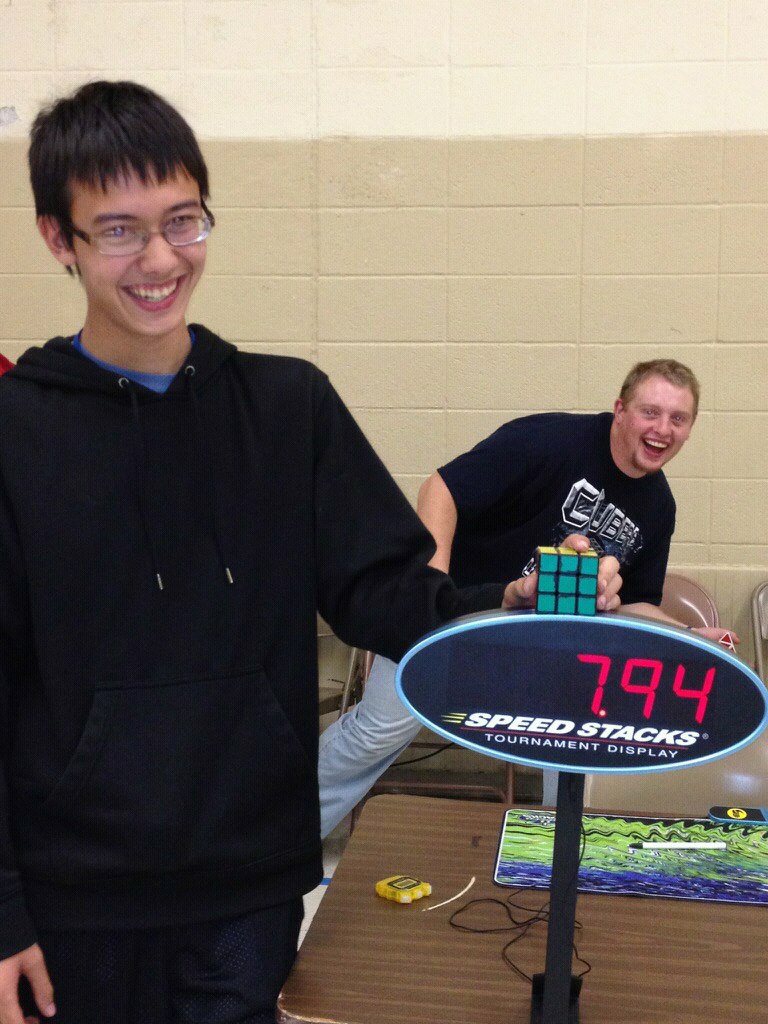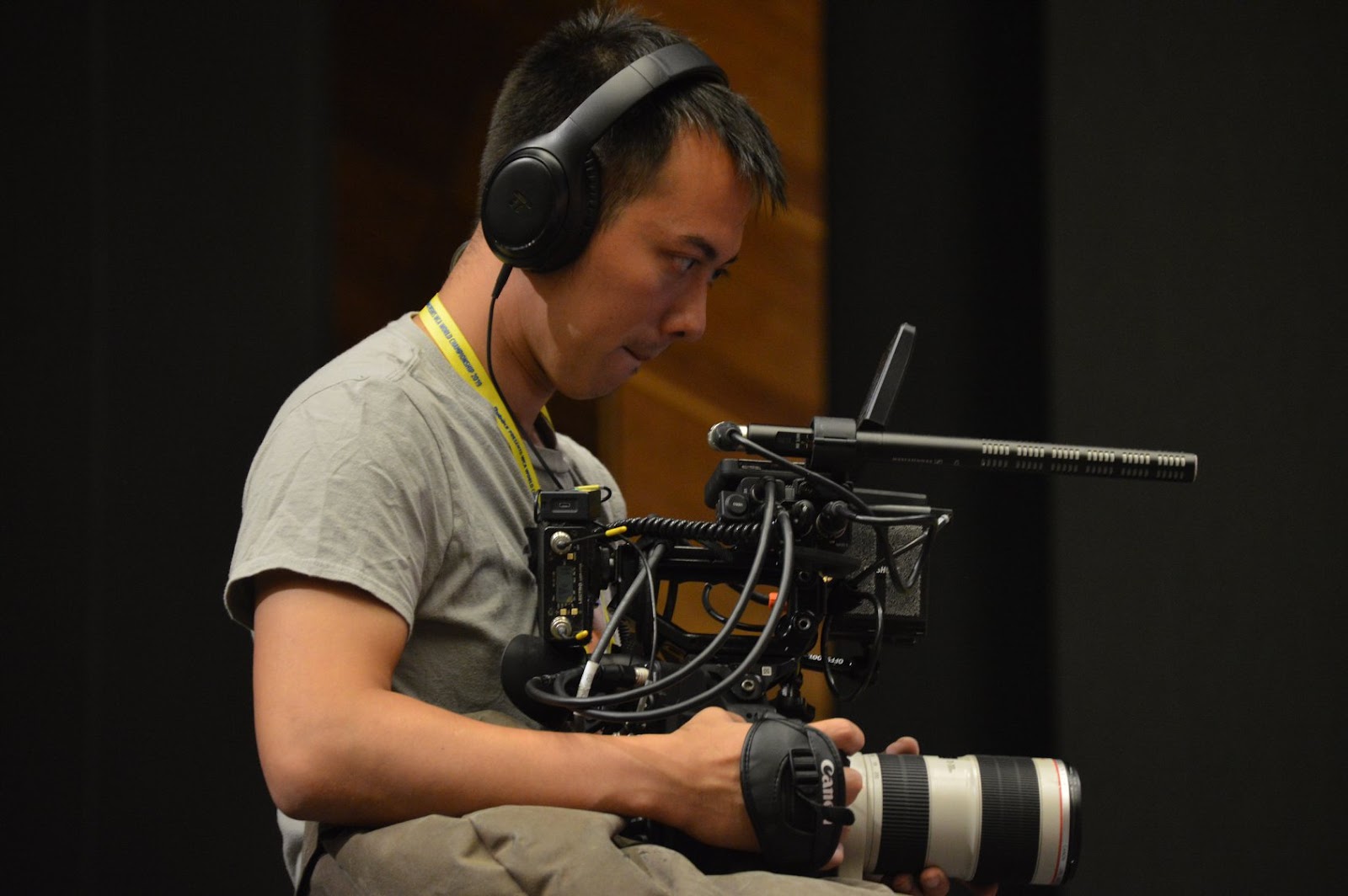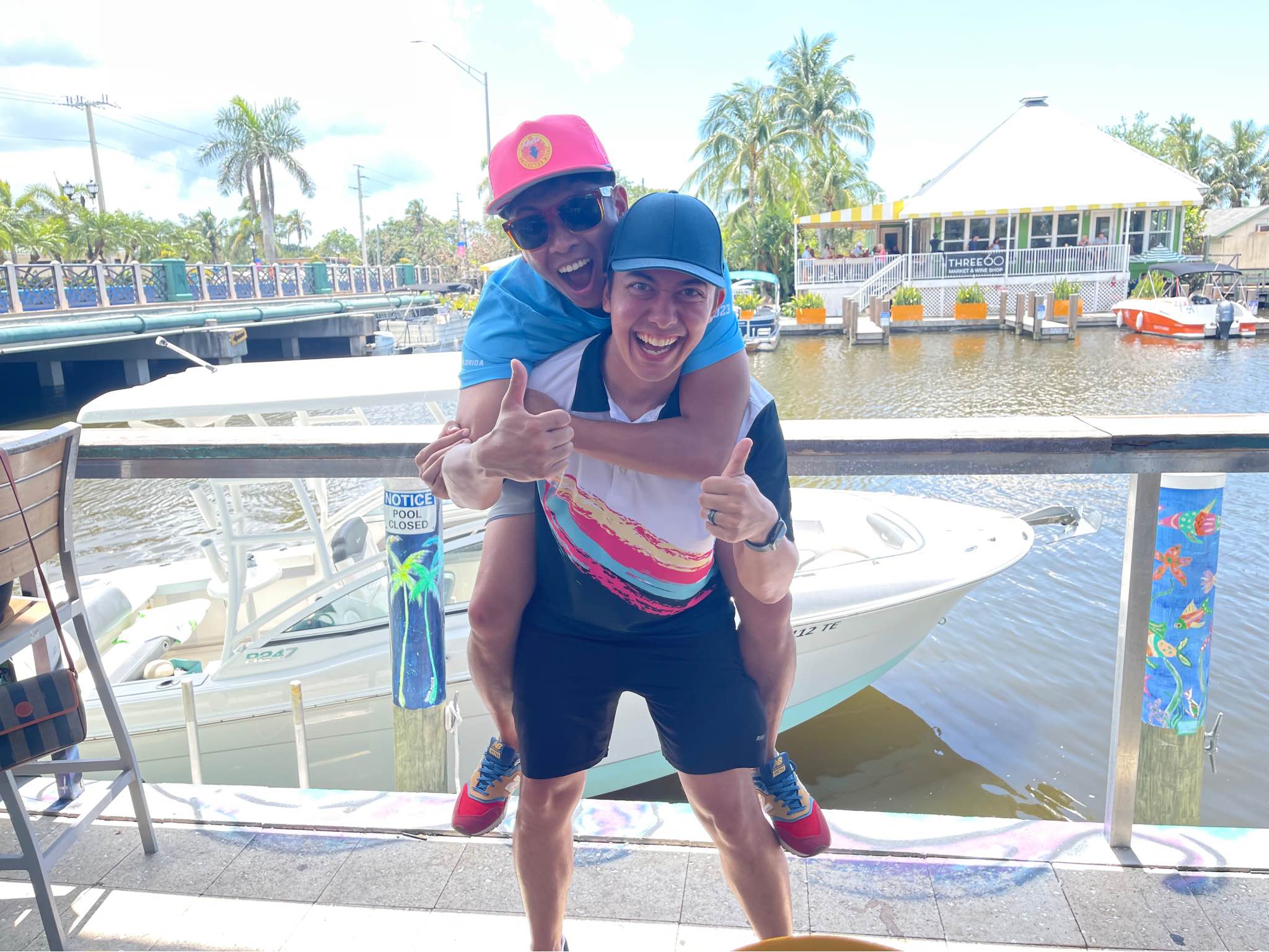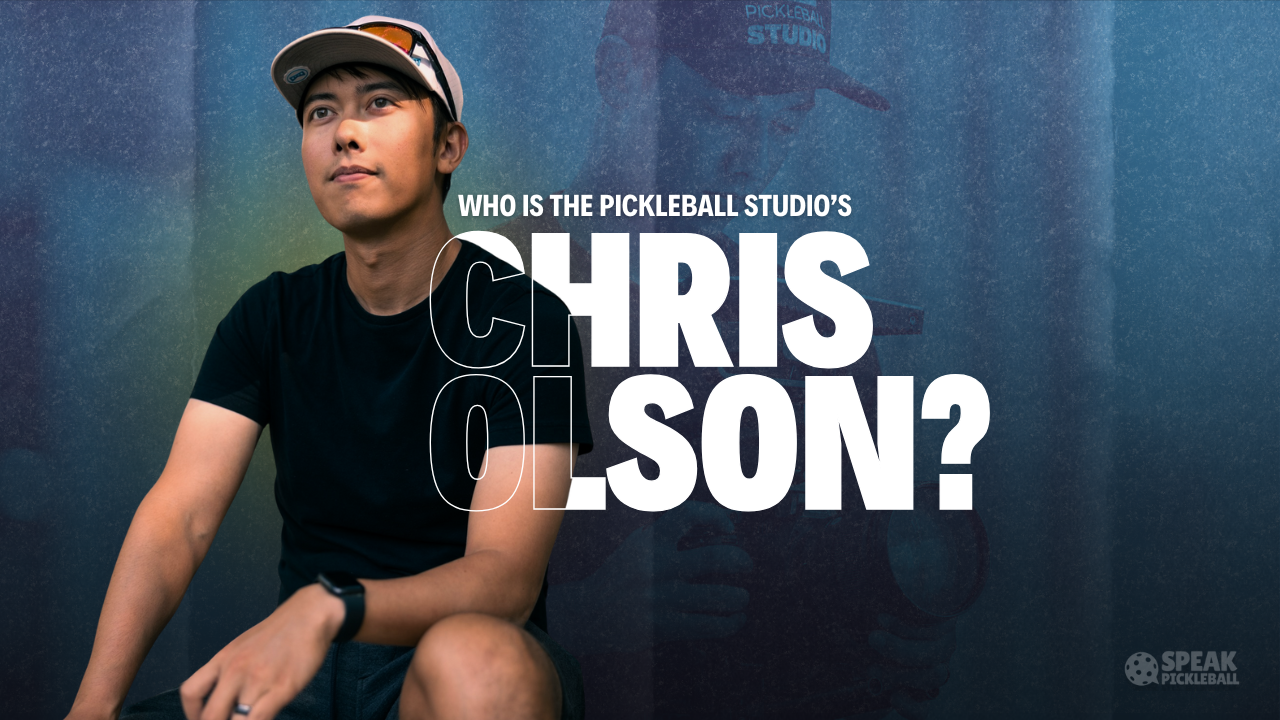Who is the Pickleball Studio's Chris Olson?
By Tuesday afternoon in suburban Minnesota, Chris Olson has already spent two hours hitting drives in his freshly painted backyard pickleball court, testing the latest paddle that arrived in yesterday's shipment.
It represents the unlikely inflection point of a journey that began with a different obsession entirely—one that taught him everything he needed to know about turning fixation into expertise, and expertise into influence.
Chris’ story reads like a parable for our creator economy age: the anxious homeschooled kid who became a world-record speedcuber, produced a Netflix documentary, and eventually built a business around reviewing pickleball equipment that companies now design with his opinions in mind.
But it's also a story about what happens when traditional educational and career paths fail to contain certain kinds of minds—and how those minds sometimes find their own way to mastery, despite circumstances that might have derailed them entirely.
"I definitely grew up most of my young teenage years until my very early 20s, feeling like a very stupid person. I had very low self-confidence," Chris recalls, his voice carrying traces of old wounds that success hasn't entirely healed.
This self-assessment seems almost laughably wrong now. His YouTube channel, Pickleball Studio, has become the authority of paddle reviews, with almost 50,000 subscribers hanging on his detailed analyses of power and performance. When he posts a negative review, companies take notice. When he praises a paddle, sales surge. But the path here was anything but straight.
When Family Falls Apart
Chris' unconventional education began with circumstances no child should have to navigate. When his parents divorced around age 10, the family structure that had provided stability simply collapsed. His father began what Chris describes as a slow retreat from responsibility that would culminate in complete abandonment.
"There was a period of years where we would go back and forth between my mom and dad's," he recalls, his tone matter-of-fact in the way people develop when discussing old trauma. "And then suddenly my dad just disappeared."
The abandonment lasted for many years—crucial years when Chris was transitioning from childhood to adolescence, when he most needed stability and guidance. As the oldest of four children, he found himself having to grow up much faster than most 12 year olds should ever be expected to.
"It forced me to grow up really quickly because I was the oldest sibling, and there was a lot of instability going on.”
Financial Struggle as a Teacher
The financial pressure was constant. His family lived in a state of what felt like perpetual economic anxiety.
"We grew up relatively poor. We were never on food stamps, but we probably weren’t far off at certain points" Chris remembers. "There were periods of time going to my dad's where there was no electricity at the house. There was a time where we didn't even have running water."
“My mom did a great job trying to make sure it was something we were less aware of, but as I got older, it was a lot easier to see that money wasn’t abundant. Despite all of this, she did an amazing job making things work. Now that I’m an adult, I don’t know how I would function with 4 kids and the lack of money.”
These weren't temporary hardships but defining features of his adolescence. The instability meant Chris learned early that security was something you created for yourself, not something you could count on from others. It was a lesson that would prove foundational to everything that followed.
Education by Necessity
Chris' education growing up was unconventional.
The way their mom approached homeschooling was more laid back than most. Chris recalls being very stubborn when it came to school, even at a very young age. If he wasn’t genuinely interested in a topic, he had no desire to pay attention.
"If I didn't want to do it, I was probably going to make it extremely difficult to teach me. I don't know why I was this way, but I just recall my mom wanting us to do certain projects, and me making it extremely difficult for her to get me to do anything.
My moms philosophy was always that if you're genuinely interested in something, we would be given all the resources we needed to learn more about it. We were rarely forced to do anything."
The combination of a difficult divorce, meeting a new spouse (who became his stepfather), complications with finances, and trying to raise four kids made having a strict homeschooling program less of a priority.
While her unconventional approach brought in outside scrutiny, Chris found it to be an advantage.
“She had a near impossible task and just tried to do her best. Some days battling over school was probably just too much."
Early Obsessions
The first obsession case came at age 12, when his uncle solved a Rubik's cube at a family party. At a lifestage stage that felt unstable, here was something concrete, measurable, achievable. Within a month, young Chris was solving it faster than his uncle. Within two years, he was traveling to national competitions. By age 15, he had broken world records.

"That thing was always in my hand if we left the house," he recalls. "It's in my pocket. I'm in the car with it. I'm in the grocery store. It didn't matter where we were. There was a Rubik's cube in my hands."
The obsession provided something he could control, measurable progress, and recognition based purely on merit. In speedcubing, your time was your time. Politics, family drama, and financial stress couldn't change the objective reality of how quickly you could solve a puzzle.
Learning Self-Reliance
The speedcubing journey also reinforced his mother's philosophy of supportive resources for things they were interested in. When Chris discovered there was a national competition he wanted to attend, he approached his mother with what felt like an impossible request.
"I decided at the last minute that I wanted to go. And I asked her if we could go. She said we could if I figured out how to get the money to get there.”
Most parents might have simply said no, given their financial situation. Instead, his mother offered what would become a template for his entire career: if you want something badly enough, find a way to make it happen yourself.
"I ended up cleaning windows and doing yard work for a friend. I saved up the money in a relatively short amount of time and we ended up going," Chris remembers.
“Moments like this and a few others taught me that if you want something, there is usually a way to achieve it, but it doesn’t mean it will be easy or handed to you.”
Building Authority Through Obsession
Chris practiced solving his cube hours a day, developing the kind of deep, deliberate practice that’s key to expertise. He was also learning, without realizing it, how to become an authority in a niche—a skill that would prove surprisingly transferable.
But perhaps most importantly, speedcubing gave him a reason to believe he might not be as stupid as he felt. When family members criticized his mother's educational choices, when strangers questioned how a homeschooled kid could amount to anything, Chris had world records as counterarguments.
The Weight of Expectations
Yet success in speedcubing came with its own burdens. As Chris approached the age to graduate high school, the questions began flooding in: What college would he attend? What would he study? The assumption was that someone smart enough to break world records would naturally follow traditional academic paths.
"I decided relatively early that I was never going to college. I never thought I was smart enough to go. And growing up without a lot of money, I knew for sure my parents weren't going to be able to pay for it. There was nothing about college that struck me as an appealing option."
Fighting External Criticism
The self-doubt was reinforced by a steady stream of external criticism. Family members questioned his mother's educational choices. Strangers at graduation parties told him he'd never make money without a degree—especially if he pursued film. Even getting a haircut became an ordeal of unwanted career counseling from his barber.
One particularly brutal encounter crystallized the skepticism he faced. At a graduation party, a friend's uncle approached him with what seemed like innocent curiosity about his post-high school plans.
"I told him that I'd be going into freelance video production," Chris recalls. "And he pauses, looks me dead in the face—first time meeting me—and says, 'I promise you, if you do that, you will never make any money. If you do not go to college, you will never make money.'"
Developing Hidden Skills
What his critics didn't understand was that Chris had already begun developing the skills that would define his career. His obsession with speedcubing had naturally led to creating YouTube videos—tutorials, reviews of different cubes, documentation of his progression. He was learning cinematography, editing, and audience engagement in service of his passion, not because someone told him these were important skills to acquire.

“When I look back from the ages of 12-18 now, I realize that the whole time my natural interest and curiosity in speedcubing was teaching me skills that would be invaluable later in life, and that most people didn’t have.
It took me a long time to realize because almost everyone around me told me I wasn’t smart enough in the traditional sense, and that I was wasting my time on things they didn’t understand. It wasn’t until I started paving my own path and showing people the potential that their opinions started to change. Until that happened, it was doubt from almost everyone I ran into.”
Chris recalls this quote as the greatest one he can think of to convey how he grew up:
“If you judge a fish by its ability to climb a tree, it will live its whole life believing that it is stupid.”
Everyone judged me based on traditional standards, and because of that I grew up feeling stupid.”
The Netflix Breakthrough
By his early twenties, Chris had built a reputation in speedcubing through his YouTube videos, bringing professional production values to what many saw as a niche hobby. When a Netflix documentary about speedcubing entered development, the director chose him as cinematographer based on his deep community connections and technical skills.
"She saw that I knew all the people in speedcubing and grew up with these people. She knew I was comfortable with them and had access to the stories" Chris recalls.
When the documentary was released in 2020, it performed far better than they even expected. But rather than validation, the success brought an unexpected burden of imposter syndrome.
"The entire time doing the Netflix documentary, I felt like a fraud," he admits. "These are people who have been in this industry longer than I have been on Earth. I'm just a YouTuber. Because of growing up with everyone telling me I was never going to make it, those thoughts kept clawing back into my mind despite seeing success most people dream about.”
Paradoxically, the documentary's success made his career more difficult. Having a Netflix credit created expectations he felt unable to meet consistently. "When trying to find more work, I wondered, 'There's no way I'm going to be on another Netflix documentary. How the heck did you even manage to land that?' So every job just felt like I didn’t belong.”
The pandemic hit shortly after the documentary's release, decimating the freelance video market just as Chris was trying to capitalize on his newfound credentials. Instead of opening doors, his biggest professional achievement had become a psychological weight that followed him into every pitch meeting.
The Pandemic Low Point
With video work drying up and his mental health suffering from isolation and financial stress, he found himself questioning everything he'd built.
"I basically hated photography and video at that point," he admits. "I think because of being good at speedcubing, and having been one of the best, I thought if you can't be the best at video, what's the point?
I'd see these people on YouTube or people further along in their career and I would be jealous and be like, 'dang, I'm never going to be like them.”
He went on to explain that imposter syndrome is something he wouldn’t wish on anyone.
“If you’ve never experienced it, you don’t know how much it eats away at your confidence. It’s mental torture all the time.”
A New Obsession Emerges
It was in this state of professional and personal crisis that a friend invited him to try pickleball. The timing seemed almost cosmically perfect: a new obsession arriving precisely when he needed one most.
"I went and tried it. I got my butt kicked," Chris laughs. "I probably got pickled. I know it was bad. I got annihilated. But it was so much fun. I went and bought a Pickleball paddle set immediately the next day."
The parallels to his speedcubing journey were immediate and obvious. Here was another niche activity with room for deep exploration, another community of passionate practitioners, another opportunity to become genuinely useful to people sharing his interests. More importantly, it came without the psychological baggage that had accumulated around his video career.
Building Authority from Scratch
What happened next illustrates something crucial about expertise in the digital age: sometimes the most valuable perspective comes from the outside. When Chris began making pickleball content in 2021, the space was underdeveloped. Most videos were shot with basic equipment and lacked detailed substance in the videos. No one was doing the kind of rigorous, systematic product testing that had become standard in other sports.
"I got in at a time where videos were not well made," Chris explains. "It reminded me a lot of the 2010 era of YouTube. People are using webcams, or really old camcorders. Things did not look professionally done in almost any way."
The Viral Breakthrough
This gap represented an opportunity, but not an obvious one. Pickleball was still seen as a retirement sport, and equipment reviews seemed like a narrow niche within a narrow niche. But Chris had learned from speedcubing that small, passionate communities could support surprisingly sophisticated ecosystems of content and commerce.
His first viral video analyzed the "chainsaw serve," a controversial technique that was dominating discussion in pickleball forums but poorly understood by most players. Chris's combination of high production values, clear explanation, and genuine expertise created something the community had been hungry for without knowing it.
"Within like two weeks, it had around 20 or 30,000 views," he recalls. "And I hadn't seen another Pickleball YouTube video get that many views so quickly. And I thought…maybe I should make more of these”
Chris was quick to explain that it was all never meant to be a business.
“The goal was never to turn this into a job. In fact, I told my wife that I didn’t want to mix video and pickleball because I didn’t want it to burn me out the way it did in speedcubing. The only reason I reconsidered it is because I saw how much I was enjoying using my camera again, and I was desperate to feel good videography again.”
The New Economy of Expertise
What Chris built next represents something distinctly modern: a business model that exists in the spaces between traditional categories. He's not quite a journalist, though his reviews influence purchasing decisions. He's not quite a pro athlete, though his skill level lends credibility to his assessments. He's not quite an entrepreneur, though he's built a profitable company around his expertise.
Instead, he occupies a role that didn't exist 20 years ago: the independent authority. In an era when traditional gatekeepers have lost much of their power, figures like Chris fill the vacuum by combining genuine expertise with accessibility and trust. His audience knows he's not beholden to any single manufacturer, and his methodology is transparent enough that viewers can judge his conclusions for themselves.
The Cost of Independence
This independence comes with costs. Chris describes the stress of knowing that a negative review might hurt someone's livelihood, or that a positive one might be interpreted as favoritism. He's faced criticism from companies whose products he's panned and from viewers who suspect his motives. The isolation of being a one-person authority can be overwhelming.
“At the end of the day, my goal is to give the consumer reliable and trustworthy information to make the best purchase that they can with their money. While yes, it sucks to bash a brand when they produce a bad product, I think it’s far worse for a consumer to be misled into buying something that makes them waste money.
Unfortunately people make assumptions about my intent all the time, but at the end of the day, I can’t please everyone. Someone will always be angry. But I have a massive backlog of videos that people can go through and see that the consistency in views and opinions has always been there. No brand is immune to getting criticism when it is warranted, small or large.”
Building Something Sustainable
But there's also something deeply satisfying about having found his place in the world. Chris employs his younger brother Aizec, supports his wife's career transition into the pickleball industry, and has built the kind of sustainable, location-independent business that would have been impossible in previous generations.
Lessons from the Margins
Education Reimagined
Chris's story illuminates several broader trends reshaping how Americans think about education, work, and success. His mother's educational philosophy—follow your interests deeply rather than checking predetermined boxes—produced exactly the kind of adaptable, self-directed learner that today's economy rewards, even if it emerged from necessity rather than pedagogical theory.
Democratized Expertise
Perhaps most importantly, his journey illustrates how digital platforms have democratized expertise and authority. You no longer need institutional credentials to become the go-to source in a field—but you do need to be genuinely useful to a community that shares your interests.
"I think if we're talking about the elite people of the world, there probably is some element of you being born with some genetics that gave you the extra advantage," Chris says when I ask about talent versus effort. "But I think in most cases, if you push yourself hard enough, you will get farther than you think, but you have to be willing to push hard enough. And I think most people aren't willing to put in that work."
Full Circle
This philosophy—that sustained effort can overcome initial disadvantages—has carried him from feeling "stupid" as a teenager to becoming one of the most influential voices in a billion-dollar industry.
It's a distinctly American story of reinvention and self-creation, but one that's been updated for an era when the tools of media production and audience building are available to anyone willing to master them.
The childhood that felt like a series of disappointments and instabilities turned out to be preparation for a career that requires extreme self-direction, comfort with uncertainty, and the ability to create structure where none exists..
As we finish our conversation, Chris mentions that his mother will be arriving soon to try out the court he built. She's nervous about playing in public, he says, so they'll practice here first.
It's a small detail, but somehow perfect: the woman who gave him permission to follow his obsessions wherever they led, despite impossible circumstances, now benefiting from the world he's built around his latest one.

Chris wrapped up by saying “I’ll forever be grateful for what my mom has given me. While it may not have been the most ideal childhood at times, I would have never become what I am now if I didn’t go through that. She gave me the ability and belief that I could learn anything if I wanted it badly enough, and that’s far more useful than memorizing random science and history facts. She was the only person that believed in me the entire time.”
In the creator economy, success stories often feel hollow—quick rises followed by inevitable falls, influencer bubbles built on nothing more substantial than algorithmic favor.
But Chris's journey suggests something more durable: that genuine expertise, patiently developed and generously shared, still has the power to create real value in the world. You just have to be willing to find your own path to get there, even when—especially when—the conventional paths are closed to you.

.svg)
Lorem ipsum dolor sit amet, consectetur adipiscing elit. Suspendisse varius enim in eros elementum tristique. Duis cursus, mi quis viverra ornare, eros dolor interdum nulla, ut commodo diam libero vitae erat. Aenean faucibus nibh et justo cursus id rutrum lorem imperdiet. Nunc ut sem vitae risus tristique posuere.
Lorem ipsum dolor sit amet, consectetur adipiscing elit. Suspendisse varius enim in eros elementum tristique. Duis cursus, mi quis viverra ornare, eros dolor interdum nulla, ut commodo diam libero vitae erat. Aenean faucibus nibh et justo cursus id rutrum lorem imperdiet. Nunc ut sem vitae risus tristique posuere.